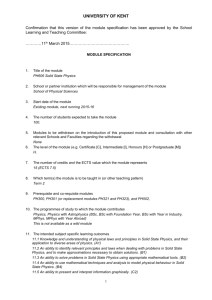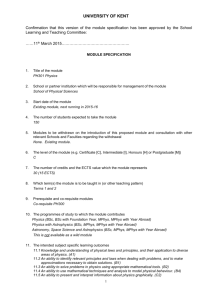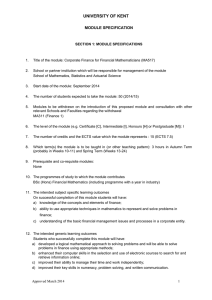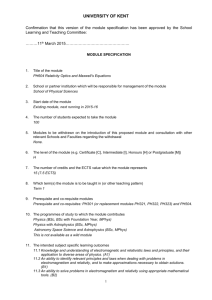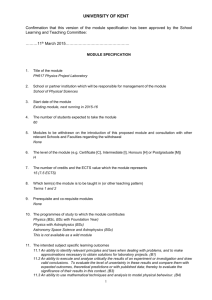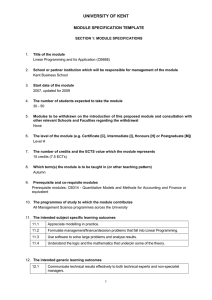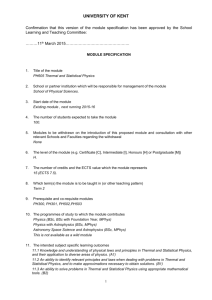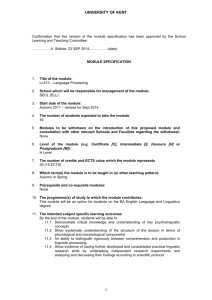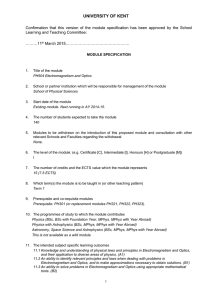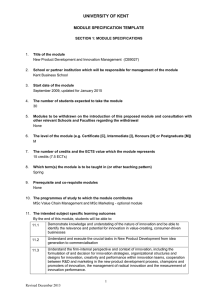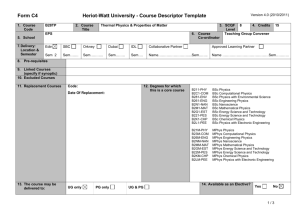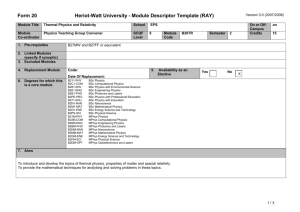module specification
advertisement
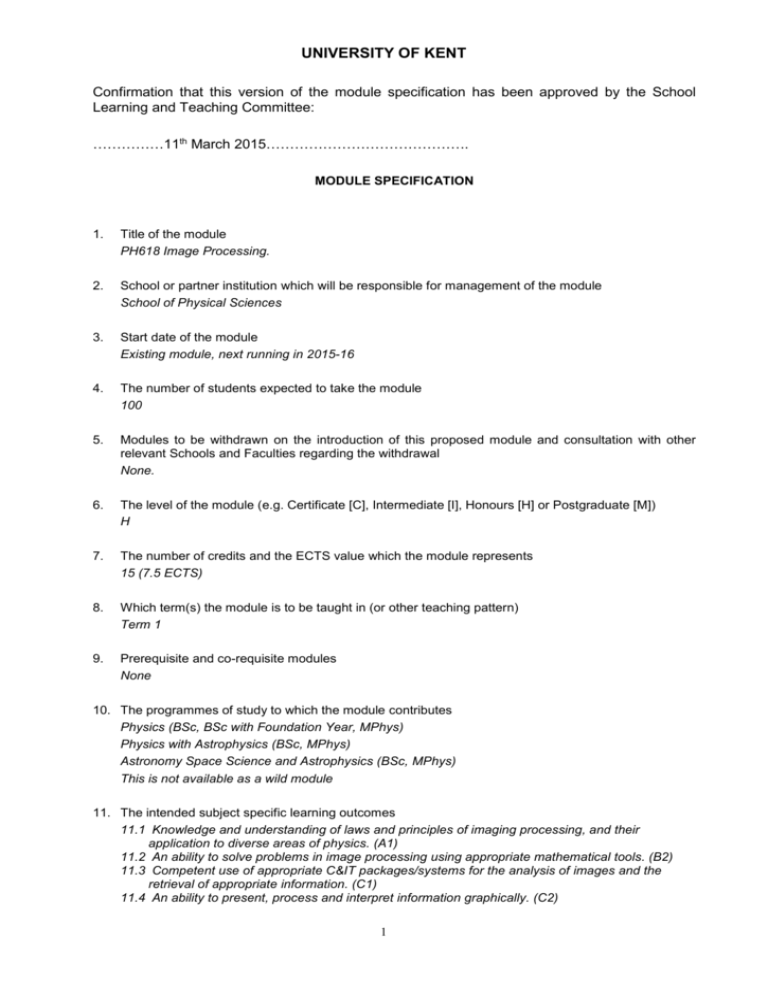
UNIVERSITY OF KENT Confirmation that this version of the module specification has been approved by the School Learning and Teaching Committee: ……………11th March 2015……………………………………. MODULE SPECIFICATION 1. Title of the module PH618 Image Processing. 2. School or partner institution which will be responsible for management of the module School of Physical Sciences 3. Start date of the module Existing module, next running in 2015-16 4. The number of students expected to take the module 100 5. Modules to be withdrawn on the introduction of this proposed module and consultation with other relevant Schools and Faculties regarding the withdrawal None. 6. The level of the module (e.g. Certificate [C], Intermediate [I], Honours [H] or Postgraduate [M]) H 7. The number of credits and the ECTS value which the module represents 15 (7.5 ECTS) 8. Which term(s) the module is to be taught in (or other teaching pattern) Term 1 9. Prerequisite and co-requisite modules None 10. The programmes of study to which the module contributes Physics (BSc, BSc with Foundation Year, MPhys) Physics with Astrophysics (BSc, MPhys) Astronomy Space Science and Astrophysics (BSc, MPhys) This is not available as a wild module 11. The intended subject specific learning outcomes 11.1 Knowledge and understanding of laws and principles of imaging processing, and their application to diverse areas of physics. (A1) 11.2 An ability to solve problems in image processing using appropriate mathematical tools. (B2) 11.3 Competent use of appropriate C&IT packages/systems for the analysis of images and the retrieval of appropriate information. (C1) 11.4 An ability to present, process and interpret information graphically. (C2) 1 UNIVERSITY OF KENT 11.5 An ability to make use of appropriate texts, research-based materials or other learning resources as part of managing their own learning. (C6) 12. The intended generic learning outcomes 12.1 Problem-solving skills, in the context of both problems with well-defined solutions and openended problems; an ability to formulate problems in precise terms and to identify key issues, and the confidence to try different approaches in order to make progress on challenging problems. Numeracy is subsumed within this area. (D1) 12.2 Analytical skills – associated with the need to pay attention to detail and to develop an ability to manipulate precise and intricate ideas, to construct logical arguments and to use technical language correctly. (D4) 13. A synopsis of the curriculum Introduction to Matlab Image representation, Image formation, Grey-scale transformation, Enhancement and extraction of image content, Fourier transforms and the frequency domain, Image restoration, geometrical transformations, Morphology and morphological transformations, Feature extraction, Segmentation. 14. Indicative Reading List Digital Image Processing; Gonzalez, R. C. & Woods, R. E. (2008) Fundamentals of Digital Image Processing: A Practical Approach with Examples in Matlab; Solomon, C. & Breckon, T. (2011) 15. Learning and Teaching Methods, including the nature and number of contact hours and the total study hours which will be expected of students, and how these relate to achievement of the intended module learning outcomes Contact hours: lectures (18 hours), console sessions (12 hours). This module is expected to occupy 150 total study hours, including directed reading, console/computer-based exercises and mathematical and conceptual problem-solving. The lectures address learning outcomes 11.1-11.4 and 12.1-12.2. Directed reading addresses 11.1, 11.2 and 11.5, and 12.1-12.2. Console sessions and directed reading address 11.3-11.5 16. Assessment methods and how these relate to testing achievement of the intended module learning outcomes Coursework 40% including class tests Final (written, unseen, length 2 hours) exam 60% The above assessments test students’ knowledge and understanding of laws and principles (11.1, 12.2) and application of techniques to model behaviour and solve problems (11.2-11.4, 12.1). In preparing for the assessments, students will need to manage their own revision using reference materials (11.5, 12.2) 2 UNIVERSITY OF KENT 17. Implications for learning resources, including staff, library, IT and space None. 18. The School recognises and has embedded the expectations of current disability equality legislation, and supports students with a declared disability or special educational need in its teaching. Within this module we will make reasonable adjustments wherever necessary, including additional or substitute materials, teaching modes or assessment methods for students who have declared and discussed their learning support needs. Arrangements for students with declared disabilities will be made on an individual basis, in consultation with the University’s disability/dyslexia support service, and specialist support will be provided where needed. 19. Campus where module will be delivered: Canterbury 3
